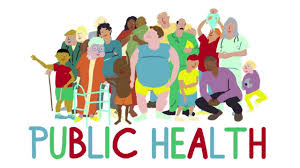
Public Health 2021

Theme: Impediment of Public Health Challenges and Nutrition during global COVID-19 Crisis
Public Health Webinar will be hosted on August 27, 2021 in Germany, Berlin. Global Public Health 2021 brings together the global leaders in public health, epidemiology and nutrition and relevant fields to present their research at this exclusive scientific program. This Webinar is based on the theme “Impediment of Public Health challenges and nutrition during global COVID-19 crisis”. The Public Health webinar hosting presentations from editors of eminent refereed journals, renowned and active investigators and decision makers in the field of infectious diseases, microbiology, immunology, infection control and prevention. Public Health webinars Organizing Committee also invites young investigators at each and every career stage to submit abstracts reporting their latest scientific researches in oral and poster sessions.
Session 1: Public health and epidemiology
Public health is concerned with protecting the health of entire populations. Epidemiology is the study and analysis of the cause, effect and structure of diseases. It is the key discipline of public health and identifies risk factors for disease and targets for preventive care. Epidemiology consists mainly of acquiring a new understanding of the correlation of genetic and environmental factors affecting human health, providing the scientific basis for applying this knowledge to global health. It is applied to cover the description of epidemic diseases and health problems such as obesity and hypertension.
Session 2: Community nutrition
Nutrition is the provision of the materials (food) needed by organisms and cells to stay alive. It's the science or practice of consuming and using food. A nutrient is a source of food, a food component, for example protein, carbohydrates, lipids, vitamins, minerals, fibre and water. To improve the overall nutritional status of vulnerable groups, address specific nutritional deficiencies in mothers and children and contribute to improved nutrition through indirect programs.
Session 3: Tobacco consumption
Tobacco use is the second leading cause of death and the fourth most common risk factor for disease worldwide. It is one of the biggest threats to Public health the world has ever known, killing more than 8 million people a year worldwide. More than 7 million of these deaths are the result of direct smoking, while 1.2 million are the result of non-smokers exposed to second-hand smoke. About 80% of the 1.1 billion smokers worldwide live in low- and middle-income countries, where the burden of tobacco-related illness and death is greatest. Tobacco use contributes to poverty by diverting household spending from basic needs such as food and shelter to tobacco. This spending behaviour is difficult to control because tobacco is highly addictive.
Session 4: Food Safety
Food safety is used as a scientific discipline to describe the handling, preparation and storage of food to prevent foodborne illness. Foodborne illnesses are usually infectious or toxic in nature and caused by bacteria, viruses, parasites or chemical substances entering the body through contaminated food or water. Access to sufficient amounts of safe and nutritious food is key to sustaining life and promoting good health. Unsafe food containing harmful bacteria, viruses, parasites or chemical substances, causes more than 200 diseases – ranging from diarrhoea to cancers. Unsafe food creates a vicious cycle of disease and malnutrition, particularly affecting infants, young children, elderly and the sick.
Session 5: Mental Health
Mental health is not always simply the absence of mental illness. It is defined as a state of well-being in which each person realizes his or her own abilities, can cope with the normal constraints of lifestyles, can paint in a productive and fruitful way and can make a contribution to his or her network. Mental health includes our emotional, psychological and social well-being. It influences the way we suppose, feel and act. It also helps to decide how we manage tension, build relationships, and make choices. It plays a key role in all levels of life, from early childhood education to maturity. Mental health problems are common, but help is available. People with mental health problems can improve and recover fully.
Session 6: Obesity and Health Risks
Obesity is a condition in which excess body fat has gathered to an ample that it may have a negative effect on health. It increases the likelihood of various diseases and conditions, particularly cardiovascular diseases, type 2 diabetes, obstructive sleep apnoea, certain types of cancer, osteoarthritis, and depression. Obesity is most commonly caused by a combination of excessive food intake, lack of physical activity, and genetic susceptibility. It is mostly preventable through a combination of social changes and personal choices. Changes in diet and exercising are the main treatments.
Market Analysis:
Public health is the science of taking care of people's health and improving the health of people and the community. Public health attempts to address such a variety of health problems by including scientific strategies from the epidemiological sciences as well as the social, biological and physical sciences. This is accomplished by adopting healthy lifestyles, by inspecting diseases and preventing injuries, by detecting and responding to infectious diseases. The major health problems facing the world today are infectious diseases, chronic diseases, injuries and mental health.
Importance & Scope:
Public health units focus on environmental health, communicable disease control, tobacco control and health promotion programmers.
The health services sub-division is expected to continue to grow strongly over the next five years due to the aging of the Australian population, the increasing prevalence of many chronic diseases and the growing coverage of private health insurance. General hospitals are expected to account for much of the growth in the subdivision due to increasing demand from the aging population and rising numbers of chronic diseases. However, growth in private health insurance coverage will likely continue to stimulate other related health services that derive income from private health benefits.
Epidemiology Associations
- American College of Epidemiology (ACE)
- American Public Health Association (APHA)
- Public Health Conference
- Association Medical Argentina (ADMISAL)
- Association Mexicana de Epidemiology (AMEPID)
- Public Health Conference
- Association for Health and Environmental Development (AHED), Egypt
- Association for Middle Eastern Public Policy and Administration (AMEPPA), USA
- Association of Chinese Epidemiology
- Association of University Programs in Health Administration, USA
- Australasian Epidemiological AssociationÂ
- Canadian Society for Epidemiology and Biostatistics (CSEB)
- Danish Epidemiological Society (DES)
- Egyptian Society of Epidemiology (ESE)
- Egyptian Veterinary Association of Epidemiology
- Public Health Conference
- Epidemiological Association of Bangladesh (EPAB)
- Epidemiological Society of Nigeria (EPiSON)
- Finnish Epidemiological Society (FES)
- French International Agency for Research on Cancer
- Public Health Conference
- German Society for Epidemiology (DGEpi)
- Indian Association of Preventive and Social Medicine (IAPSM)
- Public Health Conference
- Indian Public Health Association (IPHA)
- Indian Society for Medical Statistics (ISMS)
- International Society for Environmental Epidemiology (ISEE)
- Public Health Conference
- Iranian Epidemiological Association (IrEA)
- International Society for Pharmacoepidemiology (ISPE)
- Italian Association of Epidemiology (AIE)
- Italian Society of Medical Statistics and Clinical Epidemiology / Societal Italian di Statistical Medical de Epidemiologic Clinical (SISMEC)
- Public Health Conference
- Italy National Institute of Health
- Japan Epidemiological Association (JEA)
- Lebanese Epidemiological Association (LEA)
- Netherlands Epidemiological Society (VvE)
- Portuguese Association of Epidemiology (APE)
- Public Health Conference
- Romanian Society of Epidemiology (SRE)
- Royal Society for Public Health, UK
- Saudi Epidemiological Association (SEA)
- Public Health Conference
- Sociedad Española de Rheumatology, Spain
- Society for Epidemiologic Research (SER)
- Society for Pediatric and Perinatal Epidemiologic Research
- Southern African Clinical Epidemiology Association (SACEA)
- Public Health Conference
- Spanish Society of Epidemiology (SSE)
- Sweden The Public Health Agency of Sweden
- Swedish Society of Epidemiology (SVEP)
- Public Health Conference
- Tanzania National Institute for Medical Research (NIMR)
- Thailand National Institute of Health
- Tunisian Environmental Exposure and Epidemiology Association (TEEEA)
Public Health Institutes:Â Â
- Japan National Institute of Public Health
- Public Health Conference
- Albania Institute of Public Health
- Jordan Ministry of Health
- Angola National Institute of Health
- Public Health Conference
- Kenya Medical Research Institute
- Argentina National Laboratories and Health Institutes Administration (ANLIS)
- Libya National Centre for Disease Control
- Armenia National CDC Zelveian National Institute of Health
- Public Health Conference
- Macedonia Institute of Public Health of Republic of Macedonia
- Bangladesh Institute of Epidemiology, Disease Control & Research (IEDCR)
- Bangladesh National Influenza Centre (NIC)
- Malawi Ministry of Health
- Belgium Scientific Institute of Public Health
- Public Health Conference
- Mexico National Institute of Public Health (INSP)
- Bolivia National Institute of Health Laboratories (INLASA)
- Moldova National Center of Public Health
- Brazil FIOCRUZ (Oswaldo Cruz Foundation
- Public Health Conference
- Mongolia Public Health Institute of Ministry of Health
- Burundi National Institute of Public Health
- Morocco National Institute of Hygiene
- Public Health Conference
- Pasteur Institute of Morocco (IPM)
- Morocco Direction of Epidemiology and Control Diseases, Ministry of Health (MoH)
- Cambodia National Institute of Health
- Mozambique National Institute of Health
- Public Health Conference
- Cameroon Directorate for Combating Disease, Epidemics and Pandemics
- Myanmar National Health Laboratory
- CARICOM Center for Strategic Health Studies (CSHS)
- CARICOM Ministry of Health (MoH)
- Nepal School of Public Health and Community Medicine B.P. Koirala Institute of Health Sciences
- Public Health Conference
- Canada Public Health Agency of Canada (PHAC)
- Canada Institute national de santé publique du Québec (INSPQ)
- Netherlands National Institute for Public Health & the Environment (RIVM)
- Public Health Institute of Chile
- Public Health Conference
- Nigeria National Primary Health Care Development Agency
- Nigerian Institute of Medical Research (NIMR)
- The Nigeria Centre for Disease Control
- China Centre for Disease Control
- Norwegian Institute of Public Health
- Public Health Conference
- Colombia National Institute of Health
- Pakistan Institute of Public Health
- Costa Rica National Institute for Research on Nutrition and Health (INCIENSA)
- Palestinian National Institute of Public Health
- Cote d'Ivoire National Institute of Public Health
- Public Health Conference
- Panama Instituto Conmemorativo Gorgas de Estudios de la Salud
- Croatia National Institute of Public Health
- Papua New Guinea National Department of Health
- Cuba Institute of Tropical Medicine 'Pedro Kouri'
- Peru National Institute of Health (INS)
- Public Health Conference
- Czech Republic National Institute of Public Health
- Poland National Institute of Public Health
- Denmark National Institute of Public Health
- Portugal Institute of Hygiene and Tropical Medicine (IHMT)
- Portugal National Health Institute (INSA)
- Public Health Conference
- EcuadorNational Institute of Public Health Research-INSPI
- Korea Centers for Disease Control and Prevention
- El Salvador Ministry of Public Health and Social Assistance
- Russian Federation National Research Center for Preventive Medicine
- Estonia National Institute for Health Development
- Public Health Conference
- Rwanda Biomedical Center, Institute of HIV/AIDS, Disease Prevention and Control (RBC/IHDPC)
- Ethiopian Public Health Institute (EPHI)
- Saudi Arabia Ministry of Health
- Finland National Institute for Health and Welfare (THL)
- Serbia Institute of Public Health
- Public Health Conference
- French Institute for Public Health Surveillance (InVS)
- French International Agency for Research on Cancer
- French National Institute of Health and Medical Research (INSERM)
- Somalia National Institute of Health
- Georgia National Center for Disease Control and Public Health (NCDC)
- Slovenia National Public Health Institute
- Public Health Conference
- Germany Robert Koch Institute
- South Africa National Institute for Communicable Diseases (NICD)
- Ghana Health Service
- Noguchi Memorial Institute for Medical Research
- Spain Carlos III Health Institute
- Public Health Conference
- Guatemala National Science Center
- Sudan Public Health Institute
- GuineaNational Institute of Public Health Guinea (Guinea NPHI)
- Sweden The Public Health Agency of Sweden
- Public Health Conference
- Guinea-Bissau National Institute of Public Health (INASA)
- Syria Center for Strategic Health Studies
- Hong Kong Centre for Health Protection (CHP), Dept. of Health, Hong Kong China
- Tanzania National Institute for Medical Research (NIMR)
- Hungary National Center for Epidemiology
- Public Health Conference
- Thailand National Institute of Health
- Iceland the Directorate of Health
- Togo National Institute of Hygiene
- India National Centre for Disease Control
- Turkey Refik Saydam Hygiene Center
- Public Health Conference
- Iran I.R. Iran’s National Institute of Health Research
- Uganda Uganda Virus Research Institute (UVRI)
- Ireland Institute of Public Health in Ireland
- Public Health England
- Public Health Wales
- Israel Centre for Disease Control
- United States Centres for Disease Control & Prevention (CDC)
- United States Emory University Global Health Institute
- Italy National Institute of Health
- Public Health Conference
Vietnam National Institute of Hygiene & Epidemiology (NIHE)
Â
- Public health and epidemiology
- Community nutrition
- Tobacco consumption
- Food Safety
- Mental Health
- Obesity and Health Risks
5 Renowned Speakers
FRANK KAPHESI
University of Malawi
Malawi
Raksha Adhikari
Eco-cist
Nepal
Matt Kazam
They Laugh You Win
United States of America
Bruce Leonard
University of Texas
United Kingdom
Yury Evgeny Razvodovsky
Grodno State Medical University
Belarus






















































































































